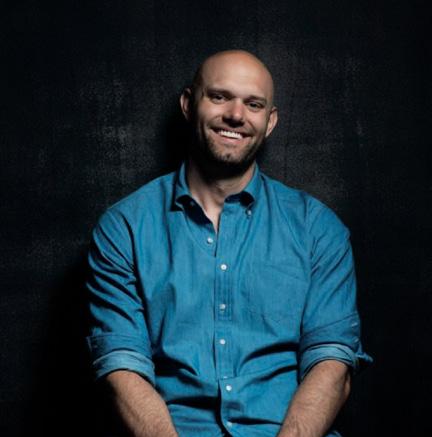BIG I MEMBERS WANT TO KNOW BERSHEAR OR CAMERON???













BIG I MEMBERS WANT TO KNOW BERSHEAR OR CAMERON???












Perpetuation. This word has been in my vocabulary since I started as a file clerk in my dad’s agency after college. All eyes were on me for long-term sustainability of our family’s business. After working my way through the ranks, the passing down of control of the agency from one generation to the next happened in 2020. Every family business is unique, and there is no one-size-fits-all approach to perpetuation. My experience was definitely not the same as some of my fellow industry colleagues. And in many cases, I am sure the buyer of the agency can be outside of the agency. But I don’t doubt there are some similarities. Open communication, careful planning and a commitment to adapt and evolve over time are some takeaways both buyers and sellers can make sure to keep in mind during the succession process.
In this issue, be sure to check out the article “Generations Coming Together: As Older Owners Exit, Young Producers Are Buying Agencies”. We’re in a very interesting time in our industry. There are an excessive amount of Baby Boomers nearing retirement. It’s a perfect time to look to the younger generation to become a force and take the reigns. And Big I Kentucky has the tools to help buyers and sellers during this process.
Did you know there’s a bank founded by independent agents that is exclusive for independent agents? InsurBanc helps with all types of agency financing including perpetuation, acquisition and working capital. For a new agency owner onboarding new producers, they even offer producer development loans to aid in the salary needed as your agency ramps up.
As a newer partner of Big I Kentucky, Agency Focus aids our members with the valuation of your agency. Carey Wallace and her team have a holistic approach to help you leverage this knowledge and you plan for your agency into the future. Our members receive a free consultation call so be sure to take advantage of this service, even if you’re just in the early stages of succession planning.
And as your association continues to grow in the offerings to assist our membership, keep an eye out for perpetuation content in 2024. Whether you’re a buyer or seller, we’ll have tools and takeaways to help you should this be a topic of interest.
You don’t have to wait until early next year to connect with your fellow Big I Kentucky members in-person! Save the date for our Clay Shoot in Wilmore, KY on August 17 and Louisville CE Day on August 22. Who knows, maybe a connection you make at an event will lead to the next step in your perpetuation process.
I’ll see you at the next event!
Whitney
Whitney L. Floyd , CIC Chair, Henderson 270.827.3543
Laura Yount, CIC, CISC Chair-Elect, London 606.878.0100
Chris Wiseman, CIC Vice-Chair, Bowling Green 270.781.2020
Allen J. Crawford, CIC, CSRM Treasurer, Somerset 606.679.6311
George “Chip” Atkins III National Director, Louisville 502.585.3600
Kevin Desmond
Immediate Past Chair, Bellevue 859-491-5100
Philip Anderton Louisville, 502.585.3277
Danny Greene Northern Kentucky, 513-534-0294
John Purdom Murray, 270.753.4751
Jared Pursley Glasgow, 270-646-8162
Carolyn Reynolds Richmond, 859-623-8485
Nick Rolf Fort Thomas, 859-781-0434
Eric Schumacher Maysville, 606-759-5663
Adam Sheridan Somerset, 606-679-6311
Tara T. Purvis President & CEO
Erin Fosson Sales & Marketing Director
Katie Hines Membership Services Director
Jennifer Hurt Office Manager
Kristie Weyer, CISR Insurance Services Director
Cassie Young Workforce Development Director

Since the theme of this newsletter is perpetuation, I thought I would share some perpetuation through the history of Kentucky’s regulation of insurance. While Lloyds of London was established in 1688, it was not until 1752 when the first insurance company in the United States was founded by Benjamin Franklin--yes, THE Benjamin Franklin. This company, Philadelphia Contributionship, insured fire losses of homes and was structured as a mutual insurance company.
Once again, Benjamin Franklin was instrumental in starting the first life insurance company, the Presbyterian Ministers’ Fund in 1759. From the invention of the automobile to today’s need for cybersecurity insurance, Insurance has always evolved as new “risks” become evident. Along with this evolution comes the growing need for comprehensive consumer protections to avoid these risks.

The insurance regulator’s role in Kentucky first came about in 1870 as a bureau within the state auditor’s office consisting of one Commissioner, a deputy and six clerks. At that time there were 57 life insurance companies and 86 property and casualty companies conducting business in Kentucky.

In 1934, the Kentucky legislature created a separate entity combining all duties, functions and authority for the regulation of Insurance in once place by establishing the Kentucky Department of Insurance (DOI). Additional legislation in 1950 placed the Department under the Executive Branch of Kentucky state government, as opposed to being an “offshoot” of the Auditor’s Office.
As the sophistication and complexities of insurance products has grown, so has the corresponding financial impacts on the citizens of the Commonwealth. The responsibilities and regulatory functions of DOI have also adapted to address this growth. During my tenure of service at the Department, beginning in 1997, I have observed this growth firsthand. While insurance offerings have become more diverse, the basic tenets continue to endure---- insurance products serve to protect consumers from financial risk, and the DOI’s charge is to regulate the Commonwealth’s insurance market to ensure financial solvency of the insurers ensuring that Kentuckians are treated fairly in the marketplace.
As an insurance professional, you must continue to evolve and stay in tune with not only the changing risk in Kentucky, but also the needs of your customers. As Commissioner, I depend upon you to do that, and I also promise you that the Department will continue to evolve to maintain our commitment to our citizens as well as to our producers and insurers.
Running a successful food truck business is hard work, but finding the right insurance program for your client is easy with West Bend.

Our business insurance program covers liabilities and expenses specifically for food truck professionals and their operations.
• Great pricing and exceptional coverage
• Experienced claim representatives
• Convenient options for reporting losses - available 24/7
Learn more about the variety of business line coverages available through West Bend by visiting thesilverlining.com.
The worst brings out our best.®

Every once in a while, the demographics align. Such is the case with younger producers’ desire to own agencies and older principals’ willingness to perpetuate to a new owner. The two necessary and vital forces of agency ownership—a new generation ready to take the reins and an older generation prepared to let go—are coming together.
Today, we’re seeing a new crop of younger agents who want to buy into agencies. And recent survey data shows that older owners may be more inclined to prepare for their agency’s succession.
According to the last few Agency Universe Studies conducted by the Big “I,” the average age of principals with 20% or more of ownership hovers around 55 while the percentage of owners 55 and up is increasing. The majority of these owners have considered at least some basic perpetuation planning, including having children or other family members take over, other principals buy part or all of their interest, or an outside party buy their interest.
At the same time, agents and producers under 40 are optimistic about their prospects. They feel good about their career choice and the potential to earn income. Most of these younger agents see insurance as a permanent career, and many have aspirations to own an agency.
Agency values are robust and buy-sell activity remains vibrant. That agencies are an attractive investment, capable of generating recurring income and profitability, is an incentive for both buyers and sellers.
For example, JP Morgan’s 2022 Business Leaders Outlook survey revealed that the percentage of business leaders across industries with plans to transfer their company increased from last year and that the expected timeline for completing a transition accelerated. “The combination of challenging market conditions and favorable valuations could be driving more business leaders to consider selling their companies,” the report says.
In short, there is probably no better time for the orderly transition of a business from one generation to the next.
The catch is that retiring principals must proactively plan for succession. At the same time, prospective owners must take the initiative to identify ownership opportunities, ask themselves if there’s a chance to become part of the succession plan, and prepare themselves for a future
management role. Both old and new generations must be intentional and actively involved in the process.
Often when agency owners reach retirement age, they haven’t given enough thought to succession. As a result, there’s a lack of qualifying candidates from within the agency to buy the business. This remains one of the leading reasons why principals sell to a third party.
Happily, there is a very good solution, and that’s a staged exit where a prospective buyer is identified early on and steps are taken to prepare that individual for ownership. A staged sale allows the exiting owner to cash in some chips now but continue to profit from growth until the agency is sold. It allows the incoming owner to earn equity and ease into their new role.
Let’s look a little further into how this can be accomplished and why today’s younger agents make ideal candidates for future owners.
Too many agency owners put off the preparation it takes to create and execute a succession plan. According to Reagan Consulting, “Poor planning in the areas of valuation, shareholder departure timing, repurchase terms and funding can render internal perpetuation virtually impossible, forcing a sale to outsiders.”
Principals should consider retaining the services of professionals who can properly value an agency; draw up a workable buy-sell agreement; and engage the legal, accounting and lending expertise necessary to ensure the smooth succession of their agency. An experienced agency valuation consultant can determine an agency’s value, which provides a benchmark and starting point to negotiate the agency’s selling price.
Most independent agencies are owned and operated by a single owner. Some seem to be more of an extension of the principal’s personality than a well-run business. Many are still paper based.
The main driver of agency value is cash flow. As agency owners begin to think about a transfer in ownership, they must put their house in order and maximize their agency’s value. That means having strong carrier relationships and a good performing book of business with strong customer retention. It means taking a hard look at expenses, income and cash flow.
It means modernizing operations, moving toward a digital office and taking advantage of online tools. Maximizing value isn’t a quick process, and owners need to allow themselves the time to accomplish it before they approach the negotiation table.
Most of the young agents who fit the mold of an ideal successor are Millennials, and they are already making a name for themselves as entrepreneurs, small business owners and startup CEOs. This generation grew up in the age of the internet and personal computing. They see the value of technology and have mastered social media.
Young agents can help drive growth at a time when older producers are slowing down and are less productive. Younger agents aren’t afraid to try new sales channels, utilize agency management systems to their full capabilities or use technology to reach customers through online marketing. In fact, it’s the way they communicate with their peers, who also prefer to do business online.
Young producers who’ve purchased books of business and acquired agencies are experimenting with new marketing methods. They’re leveraging social media and mobile apps to establish a digital presence that, in turn, is propelling organic growth. Some are in specialty markets and have created a successful niche using online tools that allow them to reach consumers in multiple states.
Whether you’re a principal approaching retirement, or a producer interested in eventually owning, there are steps you can take now to prepare for the transition. Keep these points in mind:

Have the conversation early. Identify, train and mentor the up-and-coming leaders of your agency sooner rather than later.
Don’t wait until the last minute to put together a written transition plan.
We recommend a timeframe of at least five years. It’s about creating value for your agency over the transition period to reap the most from your business.
Determine how the sale will be financed. Will the seller finance the purchase? Does the new owner have equity in the firm? Is bank credit needed? If there is a loan, can the agency generate enough cash flow to cover the loan and run the operation?
Prepare financially and emotion-ally to be an owner. Are you ready to take on the responsibility and risk of running a business? You may have to make short-term sacrifices for long-term gain to realize your dream of ownership. Are you commit-ted to getting your personal finances in order, which may mean making lifestyle changes? What’s your willingness to take on risk and debt? Prepare to borrow before you need to. Develop the skills needed to run an agency. Pursue continuing education to round out your knowledge of accounting, finance and management. Can you successfully transition from employee to management? Learn to develop employees and build teams. Familiarize your-self with the agency’s management system. Do you have a firm grasp of the agency’s sources of income and its expenses? Do you have experience in securing carrier appointments? How will you reduce expenses to maintain cash flow so you can service your debt?
Industry’s future
The path to ownership can be challenging, but there’s no better time for young producers to invest in the independent agency system. With young agents’ proficiency in all things digital and their diversity and commitment to making a positive impact on society, the future of the independent agency system is in capable hands.
We can’t wait to see where these young owners take us.
Since 1979, the Kentucky AGC Self Insurers’ Fund has provided reliable workers’ compensation coverage to the construction industry of Kentucky.

Rated A- “Excellent” by A.M. Best, the KY AGC SIF has returned dividends to qualifying members for 29 consecutive years, totaling $268 million. In 2023, $25.8 million was returned to members.
www.kyagcsif.com




















































 By: Christopher Clinton, Consultant
By: Christopher Clinton, Consultant
I have been fortunate to have been in this industry since 1981. I came from an independent agency family, majored in insurance at college and have spent time on both the company and agency sides of the business. I've had the chance to watch this industry go through major changes in product development, technology, regulation and personnel.
But the one thing that continues to stand out to me is that independent agency owners must evolve into agency leaders to ensure their future success. Here are three reasons why:
1) Talent shortages. There are 32,900 more sales agents expected to come into the industry between 2021-2031, according to the Bureau of Labor Statistics. However, it is expected that there will be 52,700 openings for insurance sales agents, each year, over the entire decade.
This shortage will create increased competition for talent and the necessity to develop, train and guide agency staff to offset the decrease in experience as seasoned personnel retires. Also, hiring younger will call for your agency to implement modern ways to prospect and connect with new accounts, requiring agency owners to become more adept at marketing strategies and using social media and other communication tools to differentiate themselves in their geographic marketplace.
2) Disruption. The rapid development of InsurTech companies will continue to disrupt the industry. Companies like Lemonade, Biberk and Boost all offer seamless platforms to quote and service clients. Commercial lines comparative rater platforms will also continue to expand and turn small commercial lines business into a commodity.
When this happens, agency owners are going to be forced into changing strategy to reduce the handling costs to the agency—as more efficiency in processing at the carrier level will result in lower premiums and loss of revenue for the agency due to savings being passed along through rate.
3) Decentralization. Agency owners need to consider what the future structure of the agency will look like over the next decade. The pandemic forced agents to work remotely. This was the first time that insurance agencies moved to a decentralized structure. The result was that many employees did not opt to return to a centralized location. The challenge going forward is to consider how to manage and monitor results to achieve the goals and objectives of the agency.
At this point, you might be thinking to yourself, “This doesn't apply to me. I'm a small agency and I know what is going on in my agency." But knowing what is going on and knowing where you are going are two very different things.
Most people don't just jump into their car for a vacation without knowing where they are going and making plans. Yet, many of the agents I have worked with, regardless of size, don't think about what they want their agency to look like in the future and what needs to get done to make it a reality. The hard truth is that many agency owners cannot find the time to think about the future or are not trained in leadership techniques to steer the process.
Here are four keys to becoming an agency leader:
Vision. Look at your present situation, determine what you want the agency to look like in the future and define how to get there. Seeing what something can become, not just what it is now, is a unique ability. If you find that you are not a visionary, get help.
Also, develop a vision statement for your agency and communicate it within the agency. This statement will describe what you want to achieve over a stated time, usually three to five years. It defines a path that will be taken to develop values, strategies and plans to get there.
Values. Values have recently been a hot topic in our society. Corporations are publicizing their value statements in an attempt to demonstrate that they care and are in touch with today's issues. In my opinion, this is a defensive reaction to criticism and it's far better to communicate those values proactively with clients,
carriers, employees and the community so they know what you stand for in advance.
Also, develop a value statement that reflects why somebody should do business with you from an ethical perspective. It should communicate what matters most to you in terms of the specific values you want to see in your culture: integrity, honesty and humility, to name a few.
Your value statement will align with your vision statement and act as your social conscience as you work toward your vision.
Strategy. Close the distance between where your agency is today and where you want it to go. Developing a strategy should include input from everyone who has a stake in ensuring the agency achieves its vision. This is particularly important in small agencies. Owners of small agencies sometimes need to consider that their staff may have insight that they do not because they are dealing with clients so the owner can focus on sales.
Determining milestones and setting goals is a necessity in developing a good strategy. Once a strategy is in place, it becomes the map that will be followed by the agency and will be a major consideration in making important business decisions. Any decisions that do not support the strategy should be vetted very carefully because it will take away resources and delay the completion of key goals that actually support the strategy.
Planning. Building a plan is the point where everything comes together. Planning enables you to take what you have done and turn it into a comprehensive document that will guide your daily activities.
Create a new plan every year. It should contain objectives that are specific, measurable, attainable, realistic and time-bound—also known as SMART. The plan then takes each of these goals and objectives and develops action steps that will be taken to complete the objective. Most importantly, plans need to be consistently reviewed to see if any corrective action is necessary. Your plan will fail if you don't establish accountability for completing the actions.
As an agency owner, you have many things that require your attention and time on a daily basis. Preparing for the future needs to be one of them.
This article was originally featured on iamagazine.com in April 2023.
Formed in 1974, InsurPac, the Big I’s federal political action committee(PAC)isoneofthelargestsmallbusinessPACs inthecountryandthemostrecognizedPACinthe insuranceindustry.

Agents, brokers and carrier partners protect their business by contributing to InsurPac.
$$ is distributed to U.S. Representatives, Senators and candidates seeking federal office who are supportive of the IA system and small business in general.
Those relationships help open doors to advocate for or against legislation that directly impacts the IA system.
InsurPac allows our federal lobbyists to consistently attend fundraising events on Capitol Hill. At each of these events they develop relationships with members of Congress and their aids.
The Big “I” successfully defended important tax policies from attempts by the current Administration and Congresstooverturnthem.ThesetaxpoliciesincludemaintainingthecurrenttaxratesforS-corpsandCcorps,keepingthe20%smallbusinesstaxdeductionintact,andpreventinganincreaseinthecapital gainstax.
The Big “I” was one of the only small business groups to successfully secure an exemption, legislatively andregulatorily,foritsmembersfromreportingbeneficialownershiptotheTreasuryDepartment’s FinancialCrimesEnforcementNetwork(FinCEN).
The Big “I” has successfully advocated for the extension of the National Flood Insurance Program (NFIP) onnumerousoccasionsoverthelastseveralyears.
InsurPac speaks as a collective voice for thousands of donors whose contributions directly to federal campaigns might otherwise go unnoticed.
1. Make a donation online at insurpac.com/donate
2.
Over 3,445 independent agents and brokers contributed a total of $1,269,794.59 in 2022.


The new E&O Guardian insurance agency risk management web site is designed to arm Big "I" members with information and tools to mitigate agency errors and omissions. Big “I” members can tap into a variety of educational materials designed to safeguard your agency. Explore the site and dive into specialty agency risk management articles on a wide variety of topics, recorded webinars, sample checklists, sample letters, an archive of newsletters, and more.


















office."

"Best speaker line-up of any conference I've attended. They knocked it out of the park."









"So many takeaways I can bring back to the


Raised over $8,000 for the Kentucky Agents Political Action Committee



























$1 to $5 million limits available
h Backed by a financially secure, A+ AM Best company

h $1M excess uninsured/underinsured motorist optional coverage available
Accepted


h Driving activity, major violations, DUIs
h Youthful operators
h No age limit on drivers and no medical certificates
h Auto limits as low as 100/300/50 in certain cases
h Up to 10 vehicles and 10 properties
h Up to three watercraft (three personal)
Auto & Home
Coverage is available for vehicles, property, umbrella and valuables to members in all states except AK, DC, DE, HI, IA, MI, MT, ND, NE, OK, SC, VT and WV. Territorial and geographic underwriting restrictions may apply.
Coverage is available for vehicles and watercraft to members in all states except AK, HI, MA, and MI.
RLI’s personal umbrella insurance is a good source of protection for your customers.





h Easy online quoting & issuance


























h Direct bill available when quoted and issued online
h No vehicle lists, property lists or information on underlying carriers required


h No age limits on drivers and no medical certificates
h Excess uninsured/underinsured motorist coverage offered in all states
h Self-underwriting application

Coverage is available for vehicles, property, umbrella, valuables, watercraft and recreational vehicles to member agents in all states except: DC, DE, HI, ME, NJ, and RI.
Coverage is available for vehicles, property, umbrella, valuables, and watercraft to member agents in all states except: AK, HI, LA, MI, ND, SD, WV and WY.


 By Dustin Miller,
By Dustin Miller,
There are dozens of previews of this year’s Governor’s Race already written (and more to come) from professional writers with way more talent than I Or maybe you could dial up ChatGPT and get a quick 500 words on the race if you were so interested So why should I read any further, you are asking yourself?
Tara and I recently got an email from a Big I member with the following question: Couldn’t sleep and was wondering about upcoming elections. What’s our best option for Governor regarding the future of our industry in the Commonwealth?
I suspect that may be a question many Big I members are asking and probably not a question AI can answer (I did check) or the mainstream media will be looking into in its daily coverage of the race from now until November 7. So below, in an attempt to answer this Big I member’s question, I have provided you an overview of the 2023 Governor’s Race..
Incumbent Governor Andy Beshear is the Democrat nominee and incumbent Attorney General Daniel Cameron is the Republican nominee. But you already knew that. Here are a few things they have in common:
- Both are younger than me, Beshear is 45 and Cameron is 37. This is the first time in my 25 years around Frankfort that both gubernatorial nominees will be younger than me A Gen Xer vs a Millennial I think that is right Regardless, the race signals a generational change in Kentucky politics
- Both are family men Cameron is married to Makenze and they have a baby, Theodore Beshear is married to Britainy and they have two children, Will and Lila, who are middle schoolers.
- Neither held elective office until serving as Attorney General. Cameron is the current AG and Beshear served as his immediate predecessor. Maybe more importantly, neither used the office of Attorney General to sue insurance agents or do harm to our industry. An important point as we think about our overall question…which of them will be a better Governor for insurance agents.
I always appreciate the opportunity to attend Big I events and speak to insurance agents. You don’t know this, but I am gleaning a lot from you in those conversations about what your thoughts are or what is going on in your communities politically. However, you all always want me to tell you who is going to win whatever election we are discussing. Handicapping some races is easier than others, but here is the process I go through when trying to predict winners and losers.
I look at the campaigns and how they are structured, and what are the goals of the campaign (beyond just winning) As you dig into each of the campaigns for the gubernatorial candidates, you see some positives and negatives for each:

- He has unbelievably high favorables or in layman’s terms he is very popular. His job approval rating is in the mid-60%, and is one of the most popular Governors in the country, according to Morning Consult.
- The power of incumbency is a real thing, but it is hard to put your finger on one number that demonstrates this fact. The relentless, several times daily press releases on everything to economic development announcements to the awarding of state and federal funds across the Commonwealth, along with the attendance at all different sorts of events from the Derby to the local ribboncutting, keep the Governor’s name top of mind, and that is impactful
- He is swimming in the Red Sea Currently, he is the only Democrat elected statewide. Republicans hold all the other offices. The state’s trend in Presidential voting, voter registration, and local elections all come up in favor of Republicans. So, he is truly an anomaly, and his campaign has to reflect that.

- Campaign structure Indications are that the Republican Party is unified in its support and deeply wants to take back control of the Governor’s office Cameron recently announced that U S Senator Mitch McConnell’s Chief of Staff and longtime District Director Terry Carmack, was taking a leave of absence from DC to come home and be his Campaign Manager. This raised some eyebrows as Carmack has been involved in statewide campaigns since 1984. He is very competent and can rally Mitch’s supporters for Cameron and drastically improve Cameron’s voter turnout, a hallmark of McConnell’s races over the years.
- The social issues. While Big I doesn’t engage on these issues, you can’t discuss an election in Kentucky without talking about abortion, guns, and LGBTQ+ issues. Kentucky voters seem to favor candidates with more conservative stances on these issues, given the proliferation of GOP statewide officeholders Cameron’s campaign has begun and will continue to highlight these issues and link Beshear to the Biden administration
Negatives for Cameron
- Women voters. Trump’s endorsement, that was helpful in the GOP primary, may not play quite so well in November. Nationally, in the mid-term elections, many many female voters were concerned about abortion, broad anti-gun control interpretations of the 2nd amendment, and other social issues. Beshear is going to need to build up substantial margins in the Jefferson and Fayette Counties, and women’s opinions on these issues could help him achieve this, especially in suburban areas. Cameron could solve some of this with his Lt. Governor choice, but regardless this will likely be a strategy the campaign has to consider.
- Lots to focus on Maybe the biggest issue for the Cameron campaign is that they have lots to focus on They need to drive down Beshear’s favorables, define Cameron on the issues and not just a Trump-endorsee, improve his popularity, and get the vote out This can all be done, but their campaign has more to do than Beshear, who will be focused on turnout
Our initial assessment would be that the insurance industry will probably be fine regardless of the winner.
With Beshear, we would get a regulatory environment with which we are familiar. This begins at the top with of the Public Protection Cabinet and includes Commissioner Sharon Clark and the team she has put together at the DOI. Commissioner Clark is someone we have known for years, who has been accessible and fair. and who has spoken at many Big I events over the past four years. We know what to expect and who to call when we have a problem.
If Cameron wins, personnel at the DOI will be a question mark. We would likely be getting to know a new Commissioner and Division Directors While we all fear the unknown to a certain extent, we have been through this before with the Fletcher and Bevin administrations Generally speaking, we anticipate Cameron would be businessfriendly and not adopt a regulatory posture that would be unduly adverse to the insurance industry

So, there you have our thoughts and an answer…sort of… to your burning question on the Governor’s Race. Now, it is up to you to decide how to cast your vote!!!
Dustin Miller is a Partner with Government Strategies, the lobbying firm for Big I Kentucky. Dustin Miller began his career handling Government, Community, and Media Relations for State Farm Insurance. He has represented clients before the General Assembly from various sectors including telecommunications, insurance, health care, and education since 2003. He served on several boards during Republican and Democrat Administrations including the Healthcare Transparency Committee and the Governor’s Earthquake Council.
Group Short Term Disability
Guardian Life Insurance Company of America
Two plan op�ons for Benet dura�ons-13 weeks or 26 weeks
Guaranteed Issue available to groups of 2+ (with specic requirements being met)
Maternity Coverage
Group Dental
Guardian Life Insurance Company of America
Offers a choice in selec�ng providers with In Network and Out of Network op�ons
Comprehensive coverage is available for Preventa�ve Services
Benets include basic services, major services and orthodon�a


Group Long Term Disability
Guardian Life Insurance Company of America
Waiver of premium available
Residual disability benets
2 levels of plans available: 60% of earnings and 66 2/3% of earnings
Guaranteed Issue available to groups of 2+ (with specic requirements being met)
Group Life Insurance
Guardian Life Insurance Company of America
A choice of plan op�ons
Cost-effec�ve premium/payment op�ons
Coverage can be extended to spouse & children
Guaranteed Issue available to groups of 2+ (with specic requirements being met)
Group Vision
Comprehensive Na�onal Network with VSP
In and out of network benets
Available to groups of 2+
We’re ready to take your order. Contact Chris ne Munoz at IIABA at (800) 848-4401 or chris ne.munoz@iiaba.net to learn more about any of these op ons.







Jennifer Hurt is Big I Kentucky’s new Office Manager. Jennifer grew up in Louisville, KY, but moved to Phoenix, AZ where she lived for 13 years before returning back to her hometown of Louisville. Jennifer is married to her husband, Michael and has 2 sons (Seth and Kerrick) , a step-daughter (Emily), and is also a dog mom to a Boxer and a Boston Terrier (Mable and Sadie). Jennifer loves to travel, go out to dinner, watch UK sports, hang out with friends and make chunky blankets. We are excited to welcome her to the Big I Kentucky team!

We're excited to welcome James Clear, author of the #1 New York Times bestseller Atomic Habits, to the Big I Kentucky Annual Convention. His work has been featured in places like Time magazine, the New York Times, the Wall Street Journal and on CBS This Morning. He is also a regular speaker at Fortune 500 companies with previous clients including Capital One, Cisco, General Electric, Honda, Intel, LinkedIn, Lululemon, McKinsey & Company, Merrill Lynch and many more.


"True behavior change is identity change. Anyone can convince themselves to visit the gym or eat healthy once or twice, but if you don’t shift the belief behind the behavior, then it is hard to stick with long-term changes. Improvements are only temporary until they become part of who you are. Every action you take is a vote for the type of person you wish to become."
"Rather than having some linear relationship with achievement, habits tend to have more of a compound growth curve. The greatest returns are delayed. Temptation bundling and commitment devices are two helpful strategies that may enable you to get over the hump and build a habit that lasts."
"When you start out building a new habit, it’s exciting in the beginning because it’s new. Over time, however, habits become routine. Sometimes they even become boring. This can be one of the first signals that it’s time to graduate your habit to the next level. You scale up when what was previously challenging is now the new normal."

 By: MarshBerry Capital, LLC
By: MarshBerry Capital, LLC
Control your own destiny by choosing a perpetuation strategy that helps build a stronger company, one with greater value, and potential ownership opportunities for its employees.
As the life cycle of a privately held insurance brokerage progresses, owners inevitably ponder “what’s next?” –knowing an eventual transition of ownership will take place. Questions begin to surface around the various routes available to preserve the firm’s legacy. Many, however, fail to consider a more crucial question: Have shareholders and/or leadership positioned the firm from a financial, cultural and organizational standpoint that maximizes shareholder value and sustains the firm’s legacy?
Many owners have not. Perpetuation is a continual series of activities and transactions, not a single event. It is the perpetual process that can give long-term sustainability to a company by gradually and continuously transitioning ownership to the next generation. It requires a defined plan that includes details about people, commitments, value, cash flow and funding. Without this process, owners are often confronted with the hard reality of selling the firm, not because they want to, but because they have failed to make perpetuation the ultimate lifestyle choice. Consequently, owners are left navigating a vast valuation gap that limits the available routes a brokerage can take to continuing a firm’s legacy.
How to transition the business at the time of succession may be a difficult decision for the owner, but here are some (but not all) of the more common considerations and potential routes to help inform the decision.
Most brokerage owners want to perpetuate internally, which
passes the ownership (and the legacy) on to family or other key leader(s). Yet, few take the necessary steps to ensure internal perpetuation can be a reality. Why? The vast majority of insurance agents and brokers are complacent and have become satisfied with the status quo of recurring revenue and highly controllable margins. The irony is that many of the characteristics that breed complacency are also the characteristics that make the insurance distribution industry attractive to buyers.
Owners choosing the internal perpetuation route should consider implementing a plan that drives predictable, profitable organic growth (PPOG) so internal buyers will accept the risk of leverage. This includes crafting an intoxicating sales culture that consistently achieves new business equivalent to 20% of prior year commission. This also means operating at a sustainable pro forma margin to ensure that the valuation delta (the difference between a firm’s internal value and the value that an external strategic buyer would pay) is as small as possible. It’s important to reinvest in the firm through identification and empowerment of a next generation leadership team that performs at a level where owners will want to “hold paper.”
One specific option for internal perpetuation is implementing an Employee Stock Ownership Plan (ESOP) trust. An ESOP generally distributes ownership among all employees, as opposed to other stock transfer methods that involve select employees. The owner receives cash for their shares and employees get financial interest in the stock that is held by the trust. Some benefits of ESOPs include: allowing owners to maintain a legacy;
• the tax treatment allows owners to potentially maximize post-sale, after-tax proceeds;
• it provides flexibility for the sale process, allowing for an exit strategy that happens over a period of time.
One challenge of an ESOP is the structure can be rather complex, requiring significant planning and legal counsel, with ongoing costs related to plan maintenance. But often owners find that the tax deductibility and other benefits associated with this model are very attractive. ESOPs are highly regulated and should be approached carefully.
If a brokerage owner is unable or unwilling to invest in an internal perpetuation plan, then considering a sale of the organization to a private equity-backed firm, broker, independent brokerage or financial institution can be a viable option. With external perpetuation, the cultural characteristics of the buyer and the valuation of a firm will be the largest areas of focus for the seller. While the current uncertainty in the economic environment plays a role in valuations, the insurance distribution industry is an incredibly attractive investment and has a long history of resiliency.
Selecting the right buyer, with the right cultural characteristics, is crucial to the success of sale. You can think of the universe of buyers along a spectrum ranging left to right from autonomous to more structured (x-axis) and top to bottom from robust resources to nominal resources (y-axis). As the number of interested buyers looking to invest in insurance distribution increases, so does the chances for sellers to find near-complete cultural compatibility. Buyers are focusing on potential targets who they believe can make them better and help give them a competitive advantage. PPOG is still the greatest differentiator for buyers coupled with next generation leadership and strong organization reinvestment.
Next, understanding the valuation delta is equally important. “What’s my firm worth?” is one of the first questions asked when owners consider a sale. Fair market value, in the broadest sense, is the price at which a business could change
hands between a hypothetical willing buyer and seller, with no external pressures. These “pressures” are stripped from the equation, and what is left is a number that’s subjective and impacted by a firm’s position at a given place and time. That’s why there is often a large valuation delta between fair market value and strategic value creating an intoxicating pull for owners to strongly consider this route, especially in periods of escalated valuations.

Hear that? That’s the ominous sound of a can being kicked further down the road. This is a default (and an easy) strategy, but it may not yield the best results. This path could result in a significant internal vs. external valuation gap. In this common scenario, profit distributions are prioritized over reinvestment which creates a shrinking asset. Employees become disinterested because of lack of opportunity and clarity about what the future holds and attracting and retaining top talent can become a challenge. Eventually, the firm will likely sell at a discount because there is no internal market and nothing that materially differentiates the firm from its peers.
In any aspect of life, transition is not an easy thing. The simple truth is that at some point, transition will occur. You can choose to embrace inevitable change and prepare for it – or allow it to dictate your path. For owners of a privatelyheld business, an eventual transition of equity will take place and they must ask themselves the critical question: Have the shareholders and/or leadership positioned the firm from a financial, cultural and organizational standpoint to maximize shareholder value and sustain the firm’s legacy?
A strong leader will deliver a message that the perpetuation process is designed to build a stronger company, one with greater value, and potential ownership opportunities for its employees. It’s time to control your own destiny while you still have an active choice in its future.
If you would like to learn more about how MarshBerry can help your firm determine its path forward, please email or call Kyle Hoeft, Vice President, at 616.723.8428.







Scan the QR Code below to register for any upcoming event.

Established Louisville agency interested in acquiring insurance agencies in Jefferson and surrounding counties. If you are interested in selling, merging, or need assistance with perpetuation, we would like to talk with you in confidence.
Call Kevin Lavin, CIC or Philip Anderton, CIC, CRM at Sterling Thompson Company at 502-585-3277
ROAD SHOWS (CE) Virtual
August 1 and 3, 2023
EMERGING LEADER CLAY SHOOT
Wilmore, KY
August 17, 2023
LOUISVILLE CE DAY (CE)
Louisville, KY
August 22, 2023
IA-MBA Virtual September 6-November 15, 2023
KEENELAND TAILGATE
Lexington, KY
October 20, 2023
ANNUAL CONVENTION & TRADE SHOW
Louisville, KY
November 15-17, 2023
Independent with top best markets looking to expand presence in Jefferson, Oldham or Shelby counties. Wanting Personal lines Producer or book of business to move or purchase. All arrangements possible, in strict confidence.
Please send inquiries to:
Turner Insurance Agency, 2460 Shelbyville Road, Shelbyville, KY 40065 or call Kurt Turner, CPCU at 502-633-6060.
We would like to thank our advertisers for their support. This publication would not be possible without you!
For classified ads or to advertise in the Kentucky IA, visit bigiky.org/magazine or call 502-245-5432.

Your free subscription gives you, and every employee of your agency, full access to Big I Kentucky’s hub for technology advice, tools, training, insights, & more.
This was previously a separate paid subscription. Now, it’s included in your membership - a $1,500 value!
Technology is critical to agency success, profitability, valuation, and employee retention. Here’s what you gain from Catalyit:
• Guides & Reviews: Selection guides for each area of your tech with side-by-side comparison charts of solution provider features, and reviews.
• Tools: An in-depth tech assessment with a custom roadmap report for your agency awaits. Get a free consult with an expert, and guidance on the best approach for your tech stack. Questions? Call our Catalyit Help Line.
• Training: From live coaching and Q&A sessions to our on-demand video vault, you’ll be able to get the most out of your tools.
• Insights: You don’t have to hunt for the latest tips and tech news. We send the tips and terms you need to know to your inbox each Monday.
• Consulting: One-on-one expert support to help you implement solutions.


(as



Big I Kentucky gratefully acknowledges these fine companies, our 2023 Industry Partners. Without their assistance, fees for the events and programs throughout the year would be significantly higher and/or the quality of the program would be restricted.









